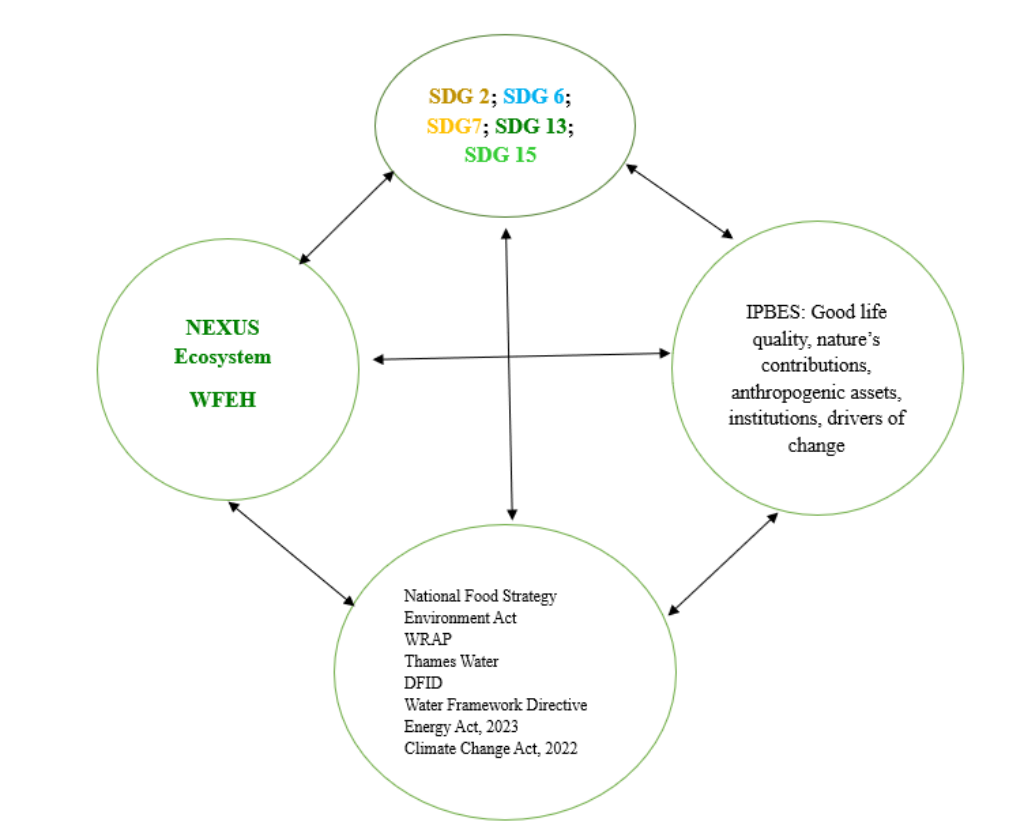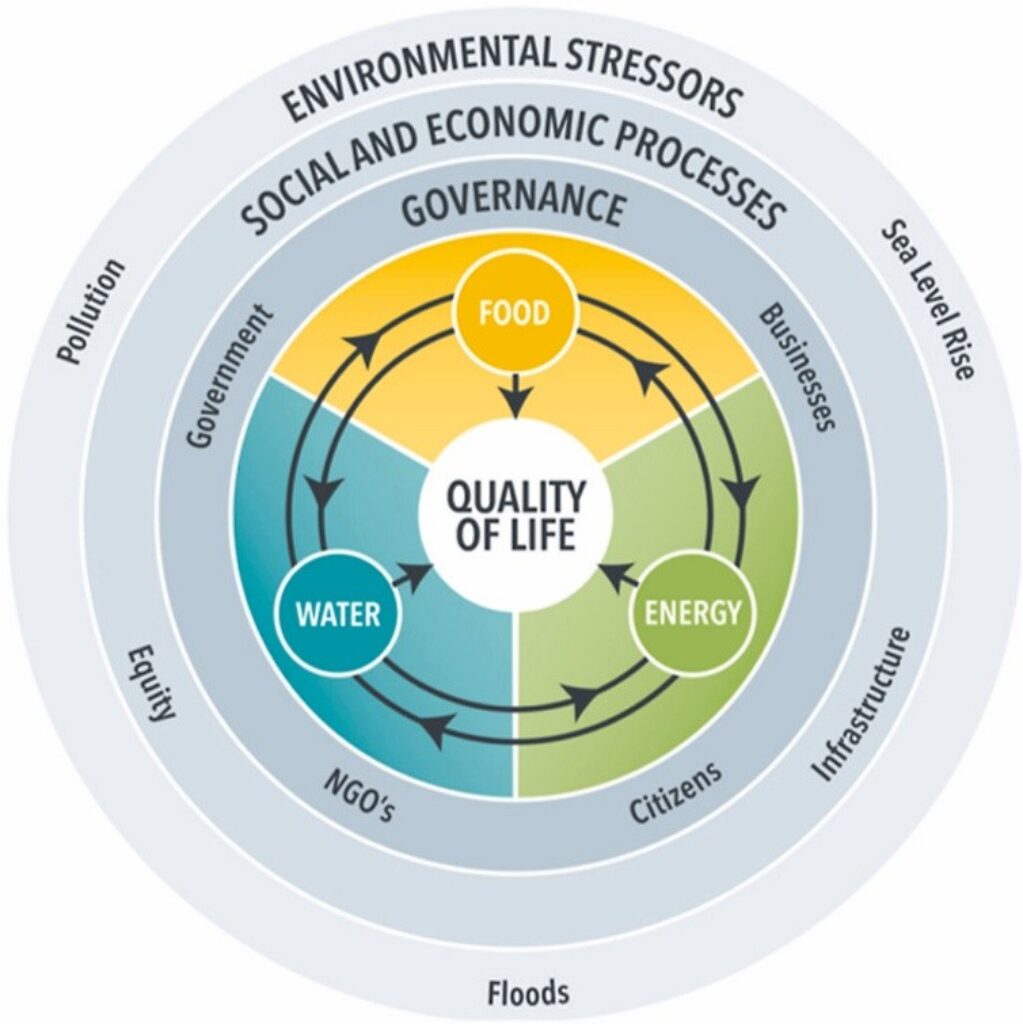Abstract
Because of the increasing demand for natural resources, for “water, food and energy, health” (UN Water, 2025), there is tremendous pressure placed on the nexus, which is known to be “driven by a rising global population’, along with “rapid urbanization, changing diets and economic growth” (UN Water, 2025). All of these changes have a serious negative impact on the sustainability of the biosphere. The greatest risks are identified in agriculture, specifically, which is “the largest consumer of the world’s freshwater resources” (UN Water, 2025). Efficient energy mechanisms have to be placed into effect in order to continue the production of food, at the same time, succeeding in promoting a healthy lifestyle, while caring for the Earth’s natural resources. The water can be transformed and saved as much as possible.
The baseline indicators, such as: acidification and eutrophication (for water), fossil resource consumption (energy), land use, crop yield (food) and global warming potential (climate), play a critical role in the sustainability of the Earth’s biosphere, which is the source of life for humans and animals. These are crucial for measuring and keeping track of consumption, as well as for the development of solutions for ensuring sustainability.
As for the specific country aligning with the UN’s Sustainable Development Goals, the United Kingdom, although falling behind on hitting the set targets, and amounting to only 21% of success rate, is making efforts in addressing these. The laws and regulations placed into effect are aiding at maintaining stability in the area of sustainability, although significant progress was stalled since 2020.
Introduction
The goal of the present paper is to provide an overview on the Water-Food-Energy-Health Nexus, in direct relation to the Sustainable Development Goals of the United Nations, ultimately linking these to the environmental laws and policies of the United Kingdom. A thematic analysis is employed, involving data coding, linking concepts and making connections between the Sustainable Development Goals of the United Nations to the Environment laws and policies of the United Kingdom. The Nexus significance is discussed in this particular context, along with its relevance.
The effects of the pandemic over the climate are briefly mentioned, also addressing vulnerabilities and interlinkages of the Nexus ecosystem. Last but not least, the effectiveness of the current laws and policies of the United Kingdom is briefly discussed, especially in the context of hitting the Sustainable Development targets set by the United Nations. The theories on risk assessment and sustainability governance are also presented, for the purpose of fulfilling the scope of the material.

Theoretical background
When it comes to the relevant theories in risk assessment and sustainability governance, especially connected to the United Nations’ Sustainable Development Goals, the most important are the Sendai Framework for Disaster Risk Reduction, which is the first major agreement of the post 2015 development agenda, providing the Member States with options for protecting gains from the risk of disaster. Moreover, the GRAF (The Global Risk Assessment Framework) was also developed in order to “inform decision making” and “transform risk governance” (UNDRR, 2025). These ultimately fit with the methodology employed in the paper, namely thematic analysis, pertaining to the qualitative paradigm of Social Sciences.
Methodology
The methodology used in this particular chapter is qualitative, if it is to be considered from a sociological standpoint. In this respect, a thematic analysis is used in the present paper, in an effort to explore the meanings behind the data. The research design involves the analysis of data to identify themes and patterns, such as research articles for the fulfillment of the above-mentioned purpose. Additionally, this form of research design was allowing for the interpretation of meaning which is found in the analyzed content. The analysis is elaborating on the Nexus ecosystem, along with its significance, the challenges that arise, culminating with presenting the public policies of the United Kingdom specifically related to areas of sustainable development.
The criteria for inclusion of data and resource selection is represented by identifying the relevant documents connected to the Nexus ecosystem, along with the relevant sources of information that elaborate on the policies related to the water-food-energy-health nexus especially placed in the context of the United Kingdom. Moreover, the criteria for exclusion is comprised of sources of information which are deemed irrelevant for the purpose of the present report. Additionally, to support the scope of the methodology, the coding of the available data is presented:
Data Coding
For the purpose of fulfilling the scope of data coding, an inductive type is used, allowing for the flow of patterns to emerge. Naturally, the codes are: water-food-energy-health-nexus, along with the Sustainable Development Goals of the United Nations, policies and climate change. The coding themes are the nexus ecosystem and the policies related to sustainable development from the United Kingdom in particular. In order to satisfy the requirements of the present paper, the selective coding procedures will be applied, discussing interlinkages and trade-offs.
The relationship between concepts was established by the thematic analysis and this particular approach directly related to the IPBES framework by connecting the crucial concepts and themes of the framework to the present work. The table resulting from the thematic analysis is presented below:


Source: Personal Processing
Description: The table aims at grouping the main themes presented, aiding to the qualitative coding process for thematic analysis.
Moving from the coding of the concepts, especially related to the sustainable development policies of the United Kingdom and their fit into the Nexus ecosystem, the rationale for choosing policies which pertain to the United Kingdom, is rooted in the fact that the country has a commitment to align with the Sustainable Development Goals of the United Nations, although it is rendered unsuccessful for the most part. However, there are crucial alignments worth taking into account when it comes to the connection made between the United Kingdom and the Sustainable Development Goals of the UN. These bonds address global challenges, such as inequality, climate change and environmental degradation, which are central to the present research. It is also worth mentioning that the Nexus ecosystem is highly significant for the United Kingdom, representing the source of sustaining the life sources in the country, including references to water, food, energy and health.
The Nexus’ Significance and Relevance to the United Kingdom’s Sustainable Development Policies and Laws
The water-food-energy-health Nexus represents a crucial aspect of sustainability, one of the main themes of the present analysis. “Ensuring access to water and sanitation for all” (United Nations Sustainable Development Goals, 2025, p. 1) is the 6th Sustainable Development Goal of the United Nations, aiming at applying the principles of equal access to natural resources for the Earth’s inhabitants. It directly relates to the “Environment Act”. Both the need and demand for water is rapidly surpassing the natural capabilities of the planet to produce it, and “half of the world’s population is experiencing severe water scarcity” (United Nations Sustainable Development Goals, 2025, p. 1). It also correlates directly with SDG 15, “Life on Land”. These problems call for urgent action on the part of the international organizations, as sustained efforts have to be made to address the need for water, while saving as much as possible. The importance of the water-food-energy Nexus is extending toward the Human Rights domain, illustrating the duty of the international organizations to care for and protect individuals, so that they could live healthily and be able to thrive. In relation to the IPBES framework, this directly applies to the natural world and its contributions to people.
The problems outlined by the United Nations represent a call for joint action on the part of all countries involved in the organization. In the case of the United Kingdom, comprising of four countries, namely: England, Northern Ireland, Scotland and Wales, considerable efforts are being made to contribute to the Sustainable Development Goals. The direct relation is provided by the implementation of Goal 6, namely “Clean water and sanitation”, which is mainly handled by Thames Water and the Water Framework Directive. Additionally, this private utility company is responsible for the supply of water, along with the management of water waste, operating mainly throughout South England. Additionally, the Department for International Development (DFID) from the United Kingdom, is directly involved in the work towards achieving the UN Sustainable Development Goals. In a United Kingdom report, it is illustrated that the “UK’s role and responsibility in delivering Goal 6, lies beyond DFID, and includes, “….global supply chains of UK based companies and other UK Government financial investments…”(Bond SDG Group, 2023, p. 1). This shows the fact that the country is placing significant emphasis on its involvement as an important player in the area of finance and investment.
In addition to the water and sanitation issues, the United Kingdom committed to abide by the 7th Sustainable Goal of the United Nations, namely the provision of “Affordable and clean energy”, which is crucial for maintaining a balanced life in the human society. Given the rise in prices in recent years, the populations of the world are finding it increasingly difficult to afford the use of energy in their homes. Alternatives to the use of fossil fuels have to be made available to the larger public, in an effort of reducing consumption and promoting a cleaner and greener environment. According to Thames Water, “21.1%” of electricity needs were “generated …from renewable sources”, also using “wind turbines at sites in East London”, along with “solar panels at over 40 other sites” (Thames Water, 2025, p. 1). This shows a significant impact of the implementation of sustainable solutions to help achieving the goals of the United Nations. As for the laws and regulations, this is connected to the Environment Act of 2021, The Energy Act of 2023 and to the Water Framework Directive. Moreover, it points to a commitment on the part of the United Kingdom to apply the principles outlined by the UN’s Sustainable Development Goals. In addition, when applied to the IPBES framework, it relates to the “nature’s contributions to people” along with the benefits that are derived from it. Moreover, it directly connects to anthropogenic assets, and refers to institutions and government systems, especially through the example provided, concerning Thames Water.
When it comes to food, this is comprised of “the full value chain for all cultivated and wild foods, fibre, feed, lumber and industrial feedstocks”, being regarded “from production to consumption and disposal” (Scoping Report for the Nexus Assessment, p. 2). This is a crucial aspect for societies, considered one of the most basic needs of humans. However, the production of food is associated with the consumption of immense amounts of water, which is needed for its production. Moreover, the inclination of the Planet’s inhabitants to consume more animal-based products is also related to the creation of a high dietary carbon footprint, which is ultimately affecting the environment.
As for the relevance to the area of policy, in the United Kingdom, an independent review was published toward the end of 2021, elaborating on the “National Food Strategy”, which is a food-policy related review by the Government. Among the strategic objectives of this particular endeavor, there are: to “escape the junk food cycle to protect the NHS”, “Reduce diet-related inequality”, “make the best use of our land”, “create a long-term shift in our food culture” (Dimbleby, 2021, p. 12). These objectives outlined by the United Kingdom are in direct relation to the IPBES framework, abiding by the principles of sustainability by reducing food waste as much as possible. Additionally, the aim of reducing food inequalities also aligns with the 2nd Sustainable Development Goal of the United Nations, namely “end hunger, achieve food security and improved nutrition, and promote sustainable agriculture”. (United Nations Sustainable Goals, 2025, p. 1) Yet, again, the United Kingdom is exhibiting a willingness to be in line with the objectives of the United Nations, and, despite the diminished progress it made over the past years, the country is working towards a better future for its inhabitants. When applied to the IPBES framework, these objectives align with the direct drivers of change, along with good quality of life which is influenced both by humans and the nature.
The United Kingdom is currently facing a severe wave of food waste, being a serious problem that has gotten into the Parliament’s watch. According to the sources published by the Parliament, the charity named “Waste and Resources Action Program” (WRAP), estimated that the “total food waste in the UK amounted to 10.7 million tons” (Burnett, Brien, Loft, Sutherland, 2024, p. 5). From this particular point of view, it is imperative for the Government to implement necessary measures to end food waste as soon as possible. It also contributes to the SDG 2 “Zero Hunger”. Several programs of the Government are placed into effect, but there is not as much of an improvement in this area as it was initially intended. These aspects are directly related to the area of institutions and governmental systems from the IPBES framework.
Health – The Effects of the Covid Pandemic Over the Climate
It is important to take into account the fact that the Covid pandemic of 2020 had devastating effects over the people and it affected societies on an extraordinary scale. It is reflecting on the health aspects of the Nexus ecosystem. Moreover, by influencing the climate to a significant extent, it directly correlates with the “Climate Change Act off 2022” and the “Environment Act, 2023”. For many Member States of the United Nations, it contributed to stalling of progress made toward the achievement of the Sustainable Development Goals, more specifically, in this case, to the SDG 13 “Climate Action”. Additionally, the economic effects of the pandemic have contributed to a significant drawback in economy and finance. Most importantly, it affected the health outcomes of millions worldwide. In this respect, the connection to the area of health presented in the IPBES framework, the pandemic placed a significant strain on the medical system. The SARS-CoV-2 virus had devastating effects on the overall health of people, especially the elderly and those who were already suffering from other diseases. However, the pandemic seems to have had “a positive effect on atmospheric and biodiversity conditions, which up to that point had been the victims of the prevailing model of social and economic development…” (Cámara, Fernández, Lacarra, Macías, Pena, 2024, p. 1). From this standpoint, it is interesting to observe the direct effects of the stalling of human involvement in connection to the environment. By diminishing the role of the humans in the environment, the natural habitat had a chance to heal and regrow. This is also raising questions related to possible solutions for the issues faced in the environment sector, but the problem is that the aim of saving the environment by isolating people will ultimately endanger the mental and physical health of millions. Finally, considering the IPBES framework, it relates to the idea of good quality of life, and direct drivers of change, especially in the context of the Covid pandemic. It also relates to the third SDG, namely “Good health and wellbeing”.
Although significant steps are taken to align with the Sustainable Development Goals of the United Nations, the United Kingdom has an array of vulnerabilities, especially related to the successful implementation of national policies and alignment with the Sustainable Development objectives.
Vulnerabilities of the Nexus in the United Kingdom
According to the World Bank, the United Kingdom is “vulnerable to the impacts of climate change from extreme weather events and changes in climatic conditions, such as sea level rise and increase in temperature.” (The World Bank, 2025, p. 1) All these changes in climate are contributing to hotter summers, along with intense rainfall, especially during the autumn and winter seasons. In addition, the coastal erosion, which represents a real problem for the country, is currently managed by the Government, through the Environment Agency, which plans a series of policies to implement, in relation to creating “climate resilient places” (UK Government, 2024, p. 1). However, the aim of the policy is to maintain the coast to its natural state as much as possible, and, where deemed necessary, the realignment of the shoreline will be managed in “a controlled way” (UK Government, 2024, p. 1).
Interlinkages of the NEXUS
The elements of the nexus are interconnected through the fact that water is needed for producing energy, while energy is required for water treatment. In addition, agriculture, the main source of food, represents the largest consumer of freshwater. When it comes to health, it is known that contaminated water poses the greatest risk for disease outbreak, and nutritious food is a key component of maintaining an optimal level of health. Moreover, energy is required to sustain health and cooking, and its lack can potentially endanger human health.
Figure 2.1 Interlinkages NEXUS – IPBES Framework in the United Kingdom’s Context

Source: Personal Processing
Description: mapping and interlinkages between IPBES, NEXUS, UN SDGs, UK’s Laws and Policies
Figure 3.1: Larger Implications of NEXUS

Source: https://www.sciencedirect.com/science/article/pii/S258981162200012X
Despite the efforts undertaken by the United Kingdom, the policies on Sustainable Development, in particular those related to the NEXUS, are considered to only “perform well on 21% of the targets” (UN Global Compact Network, 2025). This means that currently, the country is not very successful in aligning with the Sustainable Development Goals, which ultimately makes the policies largely ineffective. The long term implications on sustainability, especially considering the current effectiveness of the United Kingdom’s policies, would lead to rising temperatures, more frequent extreme weather events and a significant rise in the sea levels. Moreover, the unintended consequences would lead to greater social and economic inequalities, potential job displacement, and reduced livelihoods within the communities. It will also amount to significant negative impacts on health and would lead to environmental degradation, biodiversity and natural resource loss and exacerbation of climate change effects.
The strengths of the current laws and policies on sustainability in the United Kingdom are identified as employing comprehensive strategies, keeping a focus on reaching Net Zero targets and on targeting specific areas, along with increased awareness of the communities. On the other hand, the weaknesses of the current approaches stem from a lack of clear targets, confusing implementation, ineffective coordination and reporting, along with underperformance on the Sustainable Development Goals and lack of progress on the commitments initially taken upon by the country.
Bibliography
Bond SDG Group, (2023), SDG 6: Progress, Gaps and Recommendations for the UK, compiled by WaterAid and UK Wash Network, pp. 1-4, available at: https://www.bond.org.uk/wp-content/uploads/2023/03/sdg6_progress_gaps_and_recommendations_for_the_uk.pdf , [Online Resource]
Brien, P., Burnett, N., Loft, P., Sutherland, N., (2024), ‘Food Waste in the UK’, House of Commons Library, p. 5, available at: https://researchbriefings.files.parliament.uk/documents/CBP-7552/CBP-7552.pdf. [Online resource]
Camara, E., Fernandez, J., Lacarra, V., Macias, E., Pena, J., (2024) ‘Healthcare in the Time of Covid-19: An Environmental Perspective on the Pandemic’s Impact on Hospitals’, Applied Sciences, MDPI, 14 (10), https://www.mdpi.com/2076-3417/14/10/4007 , [Online resource]
Dimbleby, H., (2021), ‘The National Food Strategy’, Independent Review of the United Kingdom, commissioned by Michael Gove (Secretary of State for Environment, Food and Rural Affairs), p. 12, https://acrobat.adobe.com/id/urn:aaid:sc:EU:9fe04232-5868-44a9-9b6d-632e089f0547 , [Online resource]
Scoping Report for the Thematic Assessment of the Interlinkages among Biodiversity, Water, Food and Health (Nexus Assessment), pp. 1-8, https://acrobat.adobe.com/id/urn:aaid:sc:eu:681294aa-770b-4d81-b751-300864cff978
Supporting Documents/ Website, https://therisk.global/journals/guide/nexus-reports-editorial-overview , [Online resource]
Thames Water, ‘Supporting the UN Sustainable Development Goals’, https://www.thameswater.co.uk/about-us/environment/un-goals , [Online resource]
United Kingdom Government, The Environment Agency, (2024), ‘Guidance: Shoreline Management Plans’, https://www.gov.uk/guidance/shoreline-management-plans , [Online resource]
United Nations Sustainable Development Goals, https://www.un.org/sustainabledevelopment/water-and-sanitation/#:~:text=Goal%206%3A%20Ensure%20access%20to%20water%20and%20sanitation%20for%20all&text=Access%20to%20safe%20water%2C%20sanitation,for%20health%20and%20well%2Dbeing. , [Online resource]
United Nations Office for Disaster Risk Reduction, (2025), ‘Global Risk Assessment Framework (GRAF): Strengthening Methods for Risk Analysis and Risk Data Governance in Sudan’, https://www.undrr.org/event/global-risk-assessment-framework-graf-strengthening-methods-risk-analysis-risk-data , [Online resource]
United Nations Office for Disaster Risk Reduction, (2025), ‘What is the Sendai Framework for Disaster Risk Reduction’, https://www.undrr.org/implementing-sendai-framework/what-sendai-framework , [Online resource]
The World Bank, Climate Change Knowledge Portal, (2025), ‘United Kingdom’, https://climateknowledgeportal.worldbank.org/country/united-kingdom#:~:text=The%20UK%20is%20vulnerable%20to,a%20range%20of%20climate%20impacts. , [Online source]





